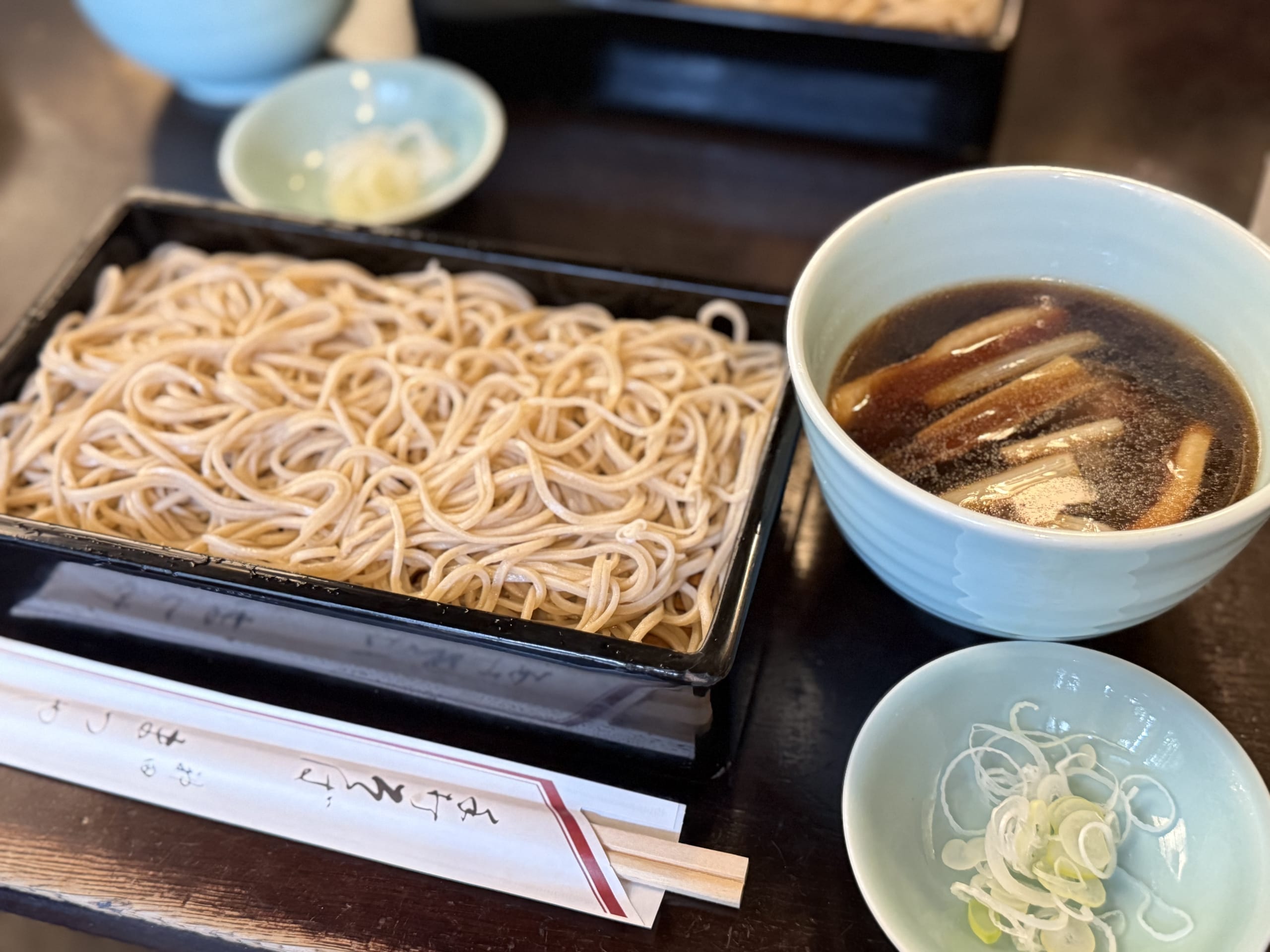An Escape to Tradition: My First Encounter with Kanda Matsuya
On a crisp autumn afternoon, I felt an undeniable craving for soba. Not just any soba, but authentic, historic Edomae-style noodles. Seeking refuge from the digital noise of modern life, I found myself wandering the streets of Kanda, Tokyo. Among the towering office buildings, a single structure stood as if frozen in time. This was my destination: Kanda Matsuya.
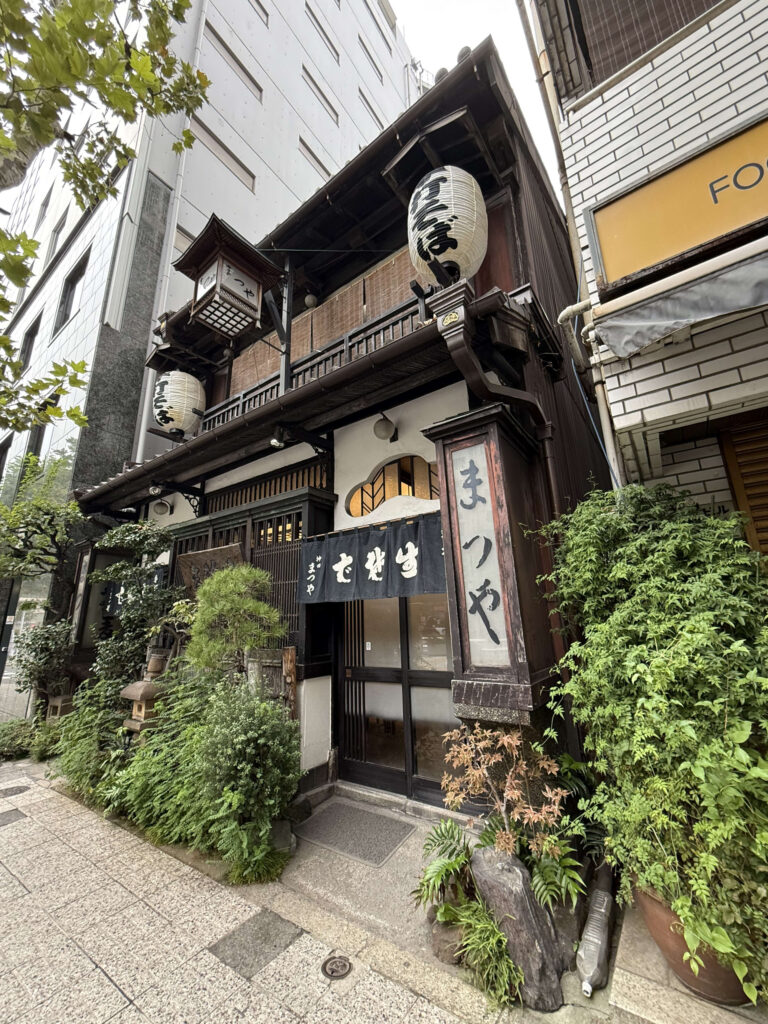
The charming wooden facade, the white paper lanterns, and the black *noren* curtain at the entrance spoke of a place that was more than just a restaurant; it felt like a cultural landmark. This was the beginning of a journey not of records, but of sensations—a true Photomo experience.
Kanda Matsuya: A Portal to Tokyo’s Soba History
Founded in 1884, Kanda Matsuya has stood in this spot for over 140 years. The charm of this establishment goes far beyond its delicious noodles. It’s a place where history, culture, and human stories intertwine to create a truly unique atmosphere.
Discovering a Historical Restaurant in Tokyo’s Backstreets
Stepping inside, the city’s hustle instantly faded, replaced by a comfortable, lively energy. The well-worn wooden tables, the bamboo-woven walls, and the swift, efficient movements of the staff all radiated a polished, time-honored beauty.
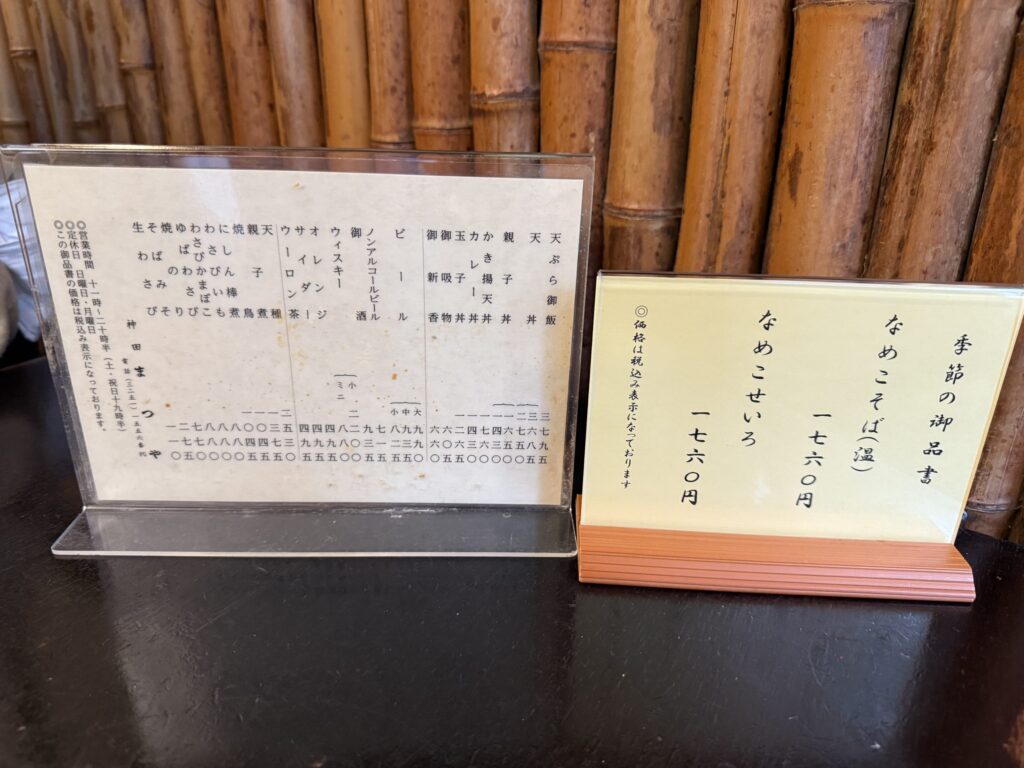
I visited on a weekday around 1:00 PM, and the place was nearly full. The clientele was diverse, from business professionals in suits to solo diners like myself and elderly couples. Yet, everyone shared a relaxed demeanor, savoring their noodles. I realized this was a place with a profound sense of welcome for all.
The Enduring History of Kanda Matsuya
The history of this old soba restaurant in Tokyo has been one of resilience. The current building, a designated Tokyo Metropolitan Historic Building, miraculously survived the Great Kanto Earthquake of 1923 and the World War II air raids. More recently, it overcame a fire in 2012.
Thankfully, the structure was spared major damage, but the incident was a shock to its many loyal patrons. Nevertheless, Kanda Matsuya made a triumphant return and continues to welcome guests today. Perhaps this indomitable spirit adds an extra layer of depth to its flavors.
The Taste of Tradition: My Experience at Kanda Matsuya
Now, it was time for the main event. I eagerly examined the menu, feeling the pride and care of this historic establishment in every character written on the page.
The Menu: A Glimpse into a Traditional Soba Restaurant in Tokyo
The menu was simple and elegant. It featured classic Edomae soba dishes, from the basic cold *mori* to the hot *kake*. Next to it stood a vertical card labeled “Owner’s Recommendations,” listing small appetizers perfect for pairing with sake. It was a tempting proposition, even in the middle of the day.
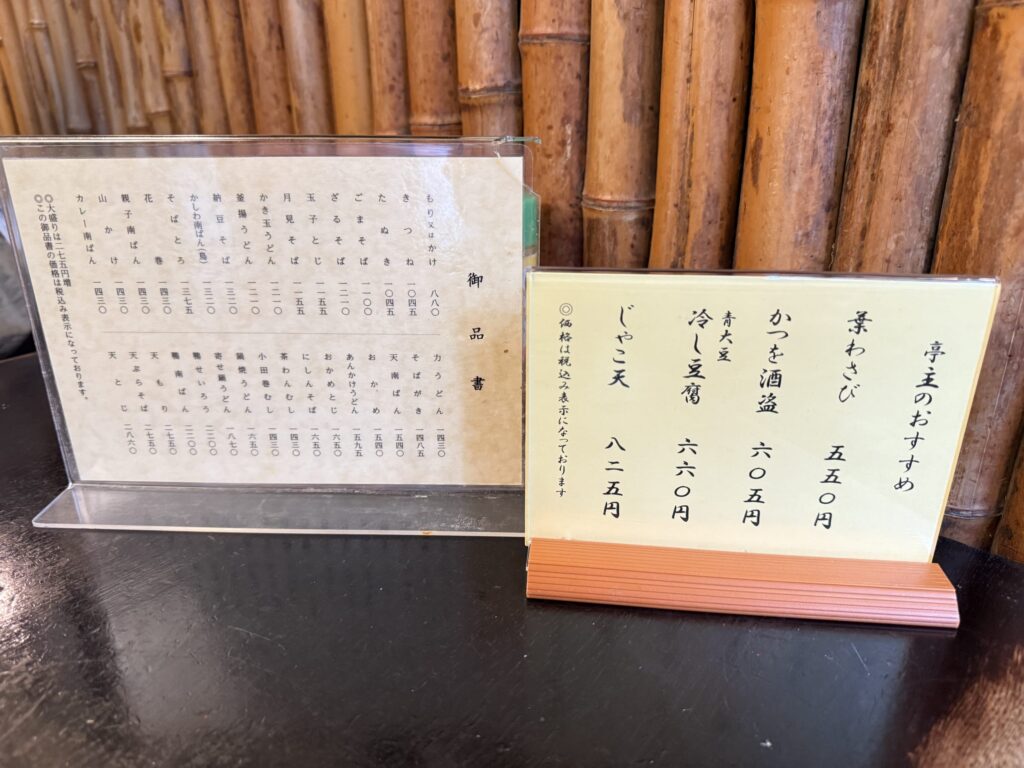
While classics are popular, I was seeking something specific: the characteristically bold, rich flavor of traditional soba in Tokyo. With that in mind, I decided on two dishes.
A Symphony of Bold Flavors: Kamo Seiro and Tempura
First to arrive was the *Kamo Seiro* (cold soba with hot duck dipping sauce). The visual contrast between the glossy noodles on the bamboo tray and the steaming bowl of sauce was immediately appetizing.
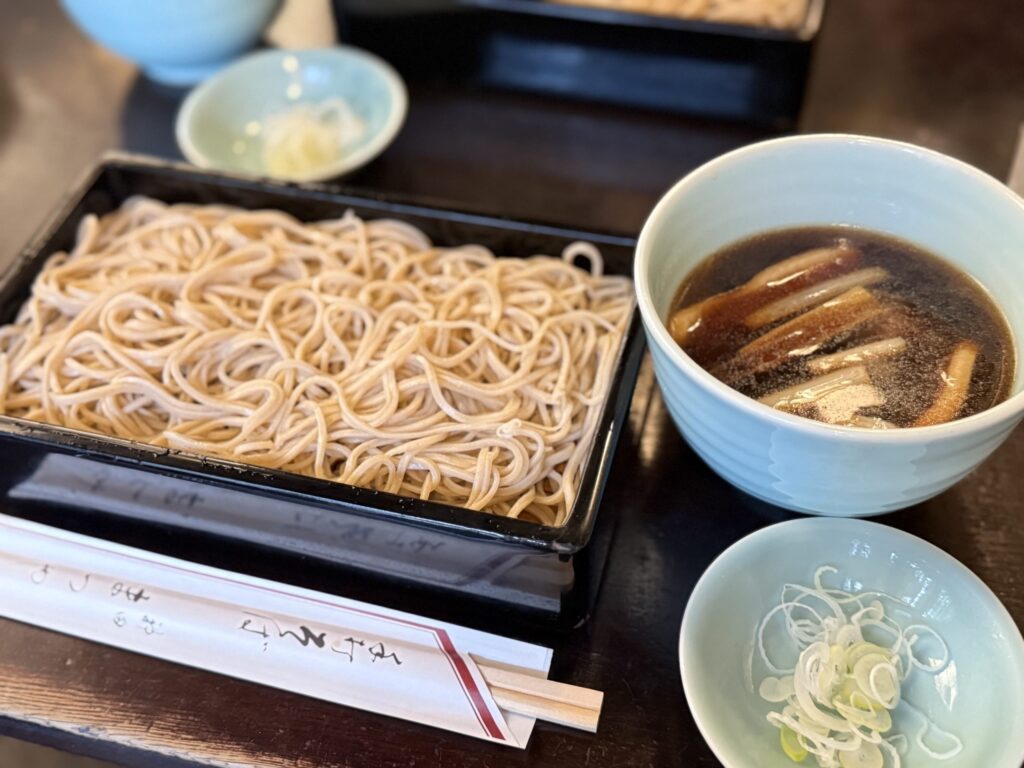
I took a sip of the dipping sauce, or *tsuyu*. It was exactly as I had hoped—incredibly rich and complex. The sharp, savory soy sauce, the deep umami of the dashi broth, and the sweet fat from the duck created a perfect harmony. Dipping the smooth, slippery noodles into this bold sauce was a sublime experience.
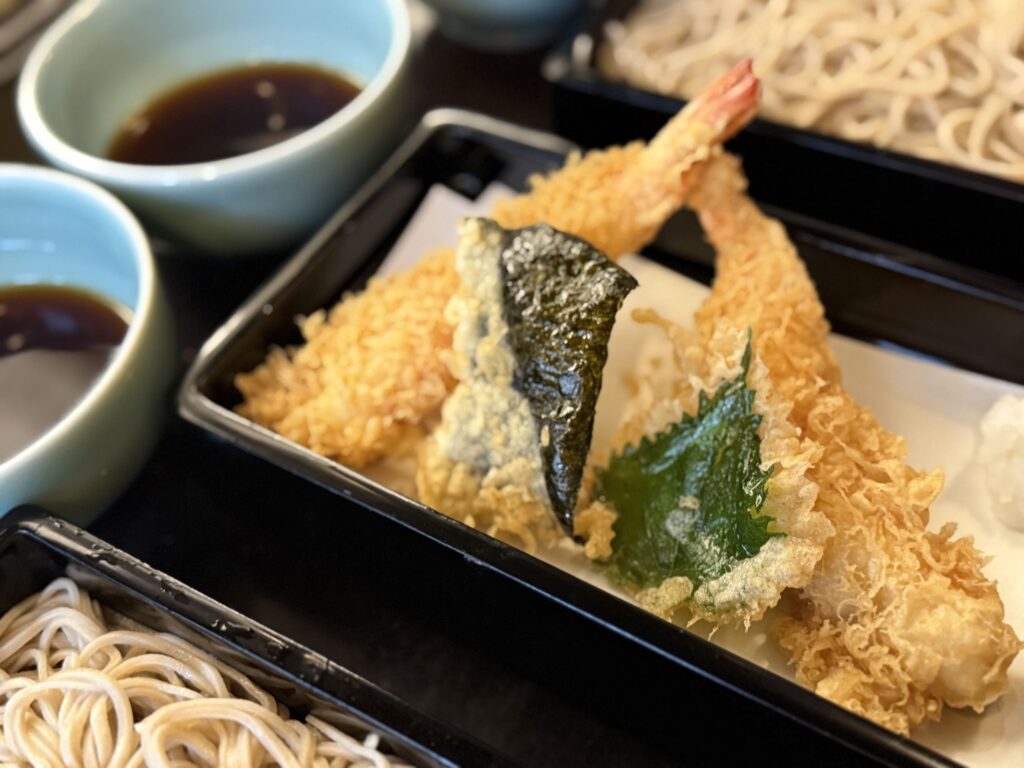
Shortly after, the *Ten-tane* (a side of tempura) was served. It included two large, perfectly crispy shrimp, along with nori seaweed and a shiso leaf. It came with its own dipping sauce and was utterly delicious. Here’s a practical tip: the soba portions are modest. If you have a healthy appetite, I highly recommend ordering the *ōmori* (large portion).
A Seasonal Delight: The Heartwarming Nameko Soba
Even after finishing both dishes, I wasn’t quite ready to leave. I wanted to explore the flavors of this Kanda soba restaurant even more. I recalled seeing a “Seasonal Special” upon entering: *Nameko Soba*. I ordered a bowl of the hot mushroom soba without hesitation.
I was amazed when the bowl arrived. It was brimming with large, glossy nameko mushrooms. The rich, earthy aroma and velvety texture were incredible. The mushroom’s umami had melted into the broth, creating another masterpiece. What truly surprised me was that despite consuming two bowls of such a rich broth, I wasn’t thirsty afterward—a testament to the high quality of the dashi.
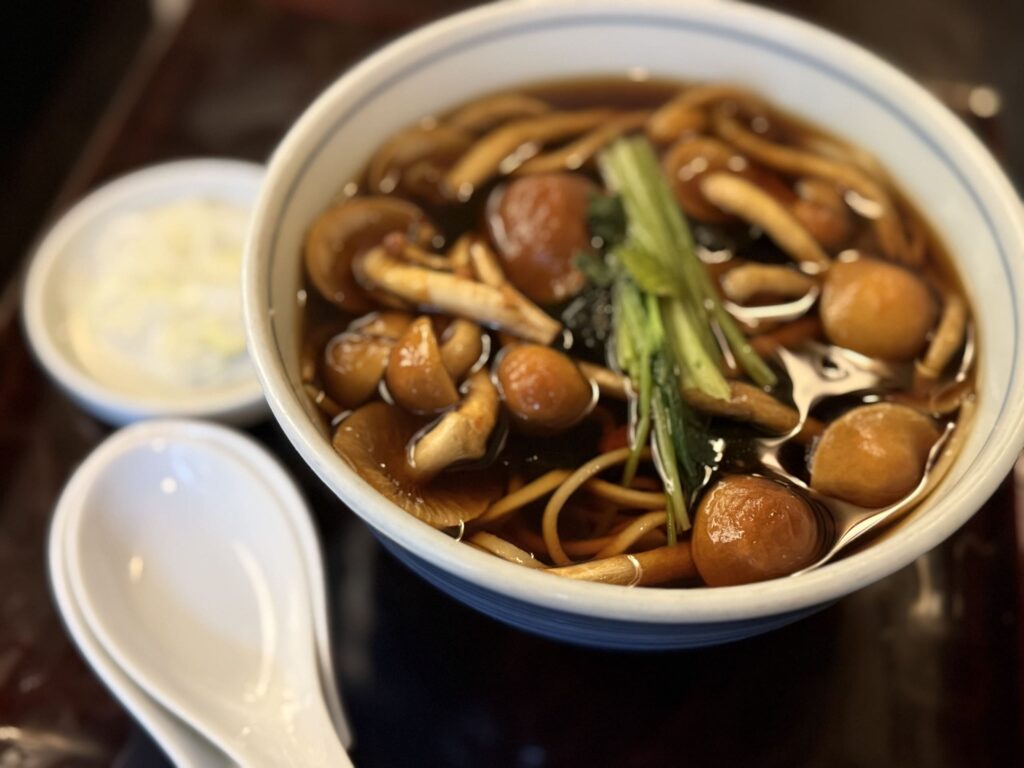
Planning Your Visit to Kanda Matsuya
I want everyone to have this amazing experience. Here is some useful information for planning your visit to Kanda Matsuya.
Navigating a Kanda Soba Restaurant: Lunch and Reservations
Given its location in the Kanda business district, lunch hours can be extremely busy. To avoid a long wait, I suggest visiting after 1:00 PM. Please note that Kanda Matsuya generally does not accept reservations, especially during lunch. Think of any waiting time as part of the anticipation.
The Art of “Soba-mae”: Enjoying Sake at an Old Soba Restaurant in Tokyo
A traditional way to enjoy soba is to start with *soba-mae*—sake and appetizers before the noodles. The menu offers sake and classic pairings like roasted nori or soba-miso. On my next visit, I am determined to indulge in this classic custom, finishing with a simple plate of cold soba.
How to Get to Kanda Matsuya
Access is very convenient. It’s a one-minute walk from Exit A3 of Awajicho Station (Tokyo Metro Marunouchi Line) or Ogawacho Station (Toei Shinjuku Line). Furthermore, it is only a five-minute walk from the North Exit of JR Kanda Station.
Final Thoughts: Why I’ll Return to Kanda Matsuya
My experience at Kanda Matsuya was more than just a delicious meal. It was an intellectual adventure, a deep dive into the rich food culture that Tokyo has nurtured for centuries. The smooth noodles, the powerful yet elegant broth, and the historic ambiance all combined in perfect harmony.
The gentle and efficient service also left a lasting impression. This is not just a place to fill your stomach; it’s a place that enriches your soul. That is why I will undoubtedly return. Next time, for the full *soba-mae* experience.
Official site:http://www.kanda-matsuya.jp/
Google Map:

